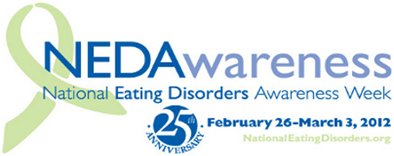 Thursday, March 1, 2012 at 05:10PM
Thursday, March 1, 2012 at 05:10PM  Thursday, March 1, 2012 at 05:10PM
Thursday, March 1, 2012 at 05:10PM  Monday, February 27, 2012 at 12:39PM
Monday, February 27, 2012 at 12:39PM In honor of National Eating Disorders Awareness Week, I wanted to draw your attention to just some of the articles that might be helpful to you this week in raising awareness for yourself, or for others! I always encourage people when trying to educate or raise awareness that they be mindful of potentially triggering information out there- articles that outline eating disorder behaviors in very specific detail, height and weight info, etc. can be especially triggering to people. These articles below are void of such details.
One helpful hint: Using social media to create awareness is a great (and easy!) way to spread the word about eating disorders this week- whether you use facebook, twitter, etc. Consider how you might influence people in your social networks!
You can click on the items below to be taken to the website or article...
5 Ways to Honor National Eating Disorder Association Week by Dr. Susan Albers
Eating Disorders Awareness Week (an article published 2 years ago- very good!)
NEDAwareness- Information about the Week, FAQ, etc.
Support for your Partner During National Eating Disorders Awareness Week 2012 by Kate Thieda
National Eating Disorder Awareness Week!!!
 Saturday, February 25, 2012 at 12:17PM
Saturday, February 25, 2012 at 12:17PM This year's theme is "Everybody Knows Somebody." I think this communicates the growing awareness that eating disorders touch the lives of everyone on some level. To learn more, consider attending an event in your area, or follow this link for more resources to learn more about eating disorders.
Tuesday, February 28th: "There is No Such Thing as Fattening Food: Debunking Dieting Myths" by Ellen Morrison, MS, RD, CEDS. 7p in Kresge Auditorium in Cate Center
Wednesday, February 29th: Body Image Discussion by Renee Avis, LPC, 6p in Ledford Hall, Room 101
Thursday, March 1st: Scale Smashing Event- bring your own scale! 3:30-5p on the back lawn of the Gaddy-Hammrick Art Center.
Rainy Day Reading
 Thursday, February 16, 2012 at 04:13PM
Thursday, February 16, 2012 at 04:13PM I hope everyone is having a great week!! It's a rainy Thursday, and I'm plugging away, catching up on work and preparing for the rest of my clients that I will be seeing this afternoon and evening. I thought I would pop in real quick to share some articles that I have read recently that may be of interest. Most of them (with the exception of two!) have been published on the Huffington Post in the last few weeks. Hope you enjoy them!! Have a great day!
The Eating Disorder Time Suck
Children Dieting at Age 7 to Ward Off Bullies
Karl Lagerfield Calls Adele Fat and Insults Us All
Plus Size Magazine 'Reveals' Low Weight Among Models
Health Risks Due to Performance Pressures on Athletes
Like Mother, Like Daughter: Eating Disorders Run in Families
 Wednesday, February 8, 2012 at 01:37PM
Wednesday, February 8, 2012 at 01:37PM Geneen Roth has written many books on women and food- Feeding the Hungry Heart, When Food is Love, Breaking Free From Emotional Eating, When You Eat at the Refrigerator Pull Up A Chair, Women, Food and God, etc. Roth writes about her personal experiences with dieting, weight loss and weight gain (both healthy and unhealthy), self-love and acceptance, gaining confidence, and feeling beautiful. No matter how you might characterize your relationship with food- restrictive, binging and/or purging, some combination of the three- there are helpful pieces of wisdom in her books for everyone.
"Living in a woman's body is not easy. Especially if you happen to look like a woman and not like an adolescent boy. We've spent years trying to slice away what makes our bodies womanly: the roundness, the lushness, and we've sliced our spirits instead. We've listened for so long to what they- our parents, our fashion moguls, our Hollywood directors- decide is attractive that we've lost our own voices. We don't know who we are anymore.
Power is born when we stop trying to unzip ourselves out of our bodies, when we stop trying to lose so much weight we look like boys or gain so much weight we can't be seen. Power is born with the willingness to be seen."
That last line is particularly powerful, and may hold a clue to body image struggles that we all experience at one time or another-- and for some, are more chronic and pervasive. Being seen and using our voices are both directly tied to our view of ourselves and our worth. Examining our worth as people, knowing where our true value comes from and claiming that can be powerful in having a healthy and appropriate view of ourselves. For more on emotional eating and body image, check out Geneen Roth's books.



